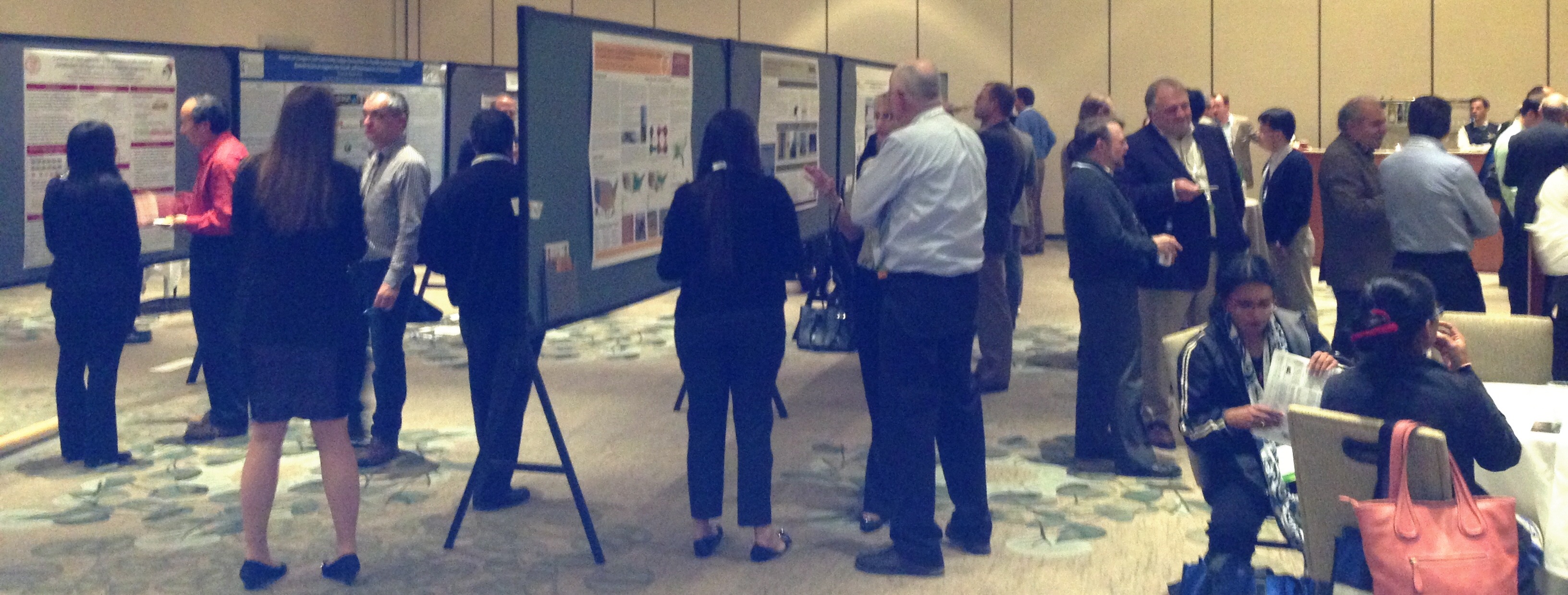by Danilo Gusmão de Quadros* (Advanced Biofuels USA) Good news for mankind worried about getting a more sustainable world: it is expected that the next few years will be decisive for the future of advanced biofuels and bioenergy with the establishment of a growing industry.

For many years, scientists have studied renewable sources of bioenergy and the best way to obtain drop-in biofuels from non-food feedstocks. However, what we have seen is a timid biofuel utilization (E10, 10 % of ethanol based on corn included in gasoline), misunderstanding by consumers about ethanol utilization and damages to small engines, a small percentage of flexfuels cars, few gas stations with E85 (85% ethanol), international conflicts and disputes about oil, political controversies (strong oil sector lobby against the fragile group representing renewable biofuel, pork and poultry industries against corn conversion), and mainly uncompetitive costs of logistics and conversion technologies.

During four days, from the 8th to 11th of December 2013, at the Westin Hotel located in the charming Glaslam Quarter of an unexpectedly chilly San Diego, CA, the 8th Pacific Rim Biofuels and Biotechnology Summit took place. There we could see an integrated industry taking the real first solid steps into the future, bringing with them the total advantages of biofuel production and utilization such as: less emissions of greenhouse gases (GHG), more jobs, local economy development, less international conflicts, and the guarantee of having energy strategically necessary to this country.
The event was well organized by Biotechnology Industry Organization (www.bio.org) with a very dynamic program about biofuels and biotechnology. More than 400 attendees had everything they needed for obtaining the latest information about the theme through many plenaries, sessions, tracks (feedstock production and utilization; renewable chemical platforms; advanced biofuels and biorefinery platforms; synthetic biology, algae, and marine biotechnology), workshops, and poster sessions. Also, this amazing event was very rich in space and moments to exchange experiences and to develop networks during the breaks and lunch.

Innovation permeated all discussions, bringing cutting-edge science to industrial biotechnology. The speakers, mainly comprised of biofuel industry people, had high grades of specialization and experience, inserting the talks inside a marketing vision.
Often less discussed in other biomass events, biogas had a good space and was presented as a local energy solution in rural areas, mainly using wastes from livestock production.
Biochemical co-products resulting from the conversion of feedstocks to advanced biofuels have a big market in this new age of world development. On the other hand, we rarely see the same enthusiasm in the vision of consumers when the subject is biofuels. With fuel, price talks louder to consumers.
New feedstock options were discussed in the world context, because they can be produced in other places, more favorable to growing crops (soil and climate conditions) and following good agricultural practices. They can then be converted using American technology. Some experiences and projects, although incipient, were shown. The amount of alternative sources of biofuels is expected to increase over the next few years, especially biodiesel.
The massive presence of industry and companies was remarkable, making the event the right place and time to exchange experiences about a diversity of advanced biofuels and biochemical products (feedstocks, conversion process, technology, costs, and marketing) beyond just networking and, of course, conducting business. People were so engaged in their business activities that often the noise of typing, sending and responding to e-mails, writing reports, annoyed me during the presentations.
Most of companies sell the know-how of converting feedstocks for advanced biofuels, however few of them have commercial scale and guaranty.
The announcement of the Navy and USDA’s “Farm-to-Fleet” biofuels program by the Agriculture Secretary Tom Vilsack and Secretary of the Navy Ray Mabus would have been made during the conference, however, the bad weather conditions in Washington provoked the shut-down that day and the announcement had to be postponed.
This program, which allows biofuels to be purchased as part of the regular procurement process, will really launch the race for better process and research development in public-private consortiums or partnerships between universities and companies, making feedstock production and conversion more efficient and cheap. Attending to the primary interest in strategic biofuel for the Navy, in the end will result in benefits for all this system, providing knowledge subsidies to scale production, conversion, and marketing solidification.
We have great expectations for the next years about technology dominium. The projects in pilot phase need to get financing to reach commercial phase (lab – pilot – demonstration – commercial). That seems to be okay. However, there are some controversies about regulations and markets. Regulations are a concern because political contradictions and disputes have overshadowed the focus on American sustainable development. Despite a few prognostications indicating marketing limitation, personally, I do not believe they are true when considering world-wide market tendencies.
Ethanol production will be one of the options, made from sugar, starch and cellulosic sources using biochemical processes. Oil seeds produced around the world will be the base of biodiesel production. In addition, we will have thermochemical pathways to ethanol, gasoline, and jetfuel from lingno-cellulosic feedstocks. With algae we can obtain a crude oil to go to refineries to produce biofuels and bioproducts.
Yes, the time is coming. We have the perspective to believe that the next three years will bring the beginning of the golden age of the biofuels industry. Plenty of projects will be finished, many plants with a variety of conversion technologies utilizing a bunch of options of feedstocks will be open, and the technology will be more and more profitable.
*Dan Quadros is a Research Scholar at University of Florida and a volunteer at Advanced Biofuels USA; E-mail: daniloquadros@hotmail.com
Interviews:
Do not miss the opportunity to get hot information about corn-based ethanol, the utilization of corn stover to produce biofuel, and much more, by listening to the exclusive interviews of Steve Hartig, General Manager, Licensing, POET-DSM, and Joost Dubois, Director Branding and Communication, DSM, conducted by Advanced Biofuels USA’s Dan Quadros.
Ethanol is an essential component of the 138-billion-gallon U.S. gasoline market, contained in over 90% of this fuel sold. It is by far the most widely produced renewable fuel in the U.S., with approximately 14 billion gallons. The majority is made from corn, but it also can be produced from other feedstocks such as agricultural residue, grain sorghum, wheat, barley and potatoes. Ethanol that is made from non-starch or non-sugar sources is called cellulosic ethanol. Cellulosic ethanol's potential is enormous. The U.S. Department of Energy estimates have identified 1.3 billion tons of harvestable cellulosic biomass in the U.S. alone, which could theoretically be used to meet more than one-third of domestic transportation fuel demand. The Renewable Fuels Standard sets an annual goal of 36 billion gallons of renewable fuel by 2022, with 16 billion gallons coming from cellulosic ethanol.
POET (http://www.poet.com) is the largest U.S. ethanol producer (1.7 billion gallons per year) and one of the world’s largest producers of ethanol and other biorefined products, operating 27 plants spread across the country (IN, IA, MI, MO, OH, MN, and SD). It produces corn-based ethanol and will start to produce cellulosic ethanol soon (“Project Liberty”). “Project Liberty” (ProjectLIBERTY.com) is scheduled to begin operations in Emmetsburg, Iowa in 2014. Beyond that, POET intends to build additional cellulosic ethanol plants co-located with its existing biorefineries, representing up to a one billion gallon per year opportunity. Its joint venture also intends to license its integrated technology package and offer a turnkey design, engineering and construction package to third parties. READ MORE (Ethanol Producer Magazine)
DSM (http://www.dsm.com/corporate/home.html) is a Dutch-based multinational life sciences and materials sciences company. DSM's global end markets include food and dietary supplements, personal care, feed, pharmaceuticals, medical devices, automotive, paints, electrical and electronics, life protection, alternative energy and bio-based materials. It produces enzymes and yeasts, considered the technological heart of the biomass conversion within the biorefinery.
To learn more about the POET-DSM partnership, visit POETDSM.com.
1 – Could you briefly introduce the work of DSM-POET for us?
Joost Dubois
2 – Could you tell us the current situation of corn production in the US? How much of it is converted into ethanol?
Steve Hartig
3 – And about the corn stover, do you know the amount we have to convert into biofuel?
Steve Hartig
4 – Corn is the base of ethanol production in the US today. However, it is also used to feed animals and this sector has been complaining about the corn price. How do you evaluate this conjuncture?
Steve Hartig
5 – Could the utilization of corn stover to biofuel production stop corn kernel conversion in the US?
Steve Hartig
6 – How to solve the logistic issues related to using corn stover as feedstock?
Steve Hartig
7 – Could you detail the expected cost model for cellulosic-based biofuel that you have been working with?
Steve Hartig
8 – How does DSM-POET intend to replicate the cellulosic-based biofuel conversion technology?
Joost Dubois
9 – What is your opinion about US renewable fuels policy?
Steve Hartig
Cool Planet
Interested in knowing more about the biofuels industry, market, policy, conversion technologies and carbon negative fuel cycle? Listen to the exclusive interview of Wes Bolsen, director of Cool Planet Energy Systems, by Advanced Biofuels USA’s Dan Quadros.
Cool Planet (http://www.coolplanet.com) has developed a patented process that converts non-food biomass into gasoline through mechanical and chemical processes. Its process, known as the carbon negative fuel cycle creates drop-in gasoline that could be used in any vehicle on the road today.
1 – Which is the main idea of Cool Planet initiative?
2 – Could you describe the history of Cool Planet briefly?
3 – What are the advantages and limitations of having small scale facilities for biofuels production?
4 – Considering smaller facilities, from the one side we have the logistic issue solved, on the other hand I am concerned about the possibility of increasing costs per gallon. What do you think about it?
5 – Could you explain the carbon negative fuel cycle?
6 – What is the process of research and development (R&D) of Cool Planet Energy Systems?
7 – What is your opinion about biofuel policy, considering that we have different interests being defended by lobbies in the congress?
8 – Is the Cool Planet conversion process based on pyrolysis? Could you clarify the conversion technology used?
9 – Could you detail the model of cost adopted by Cool Planet?
10 – Where is Cool Planet now and where does it wants to be in the future?
Nearly 55,000 articles in our online library!
Use the categories and tags listed below to access the nearly 50,000 articles indexed on this website.
Advanced Biofuels USA Policy Statements and Handouts!
- For Kids: Carbon Cycle Puzzle Page
- Why Ethanol? Why E85?
- Just A Minute 3-5 Minute Educational Videos
- 30/30 Online Presentations
- “Disappearing” Carbon Tax for Non-Renewable Fuels
- What’s the Difference between Biodiesel and Renewable (Green) Diesel? 2020 revision
- How to De-Fossilize Your Fleet: Suggestions for Fleet Managers Working on Sustainability Programs
- New Engine Technologies Could Produce Similar Mileage for All Ethanol Fuel Mixtures
- Action Plan for a Sustainable Advanced Biofuel Economy
- The Interaction of the Clean Air Act, California’s CAA Waiver, Corporate Average Fuel Economy Standards, Renewable Fuel Standards and California’s Low Carbon Fuel Standard
- Latest Data on Fuel Mileage and GHG Benefits of E30
- What Can I Do?
Donate
DonateARCHIVES
- February 2026
- January 2026
- December 2025
- November 2025
- October 2025
- September 2025
- August 2025
- July 2025
- June 2025
- May 2025
- April 2025
- March 2025
- February 2025
- January 2025
- December 2024
- November 2024
- October 2024
- September 2024
- August 2024
- July 2024
- June 2024
- May 2024
- April 2024
- March 2024
- February 2024
- January 2024
- December 2023
- November 2023
- October 2023
- September 2023
- August 2023
- July 2023
- June 2023
- May 2023
- April 2023
- March 2023
- February 2023
- January 2023
- December 2022
- November 2022
- October 2022
- September 2022
- August 2022
- July 2022
- June 2022
- May 2022
- April 2022
- March 2022
- February 2022
- January 2022
- December 2021
- November 2021
- October 2021
- September 2021
- August 2021
- July 2021
- June 2021
- May 2021
- April 2021
- March 2021
- February 2021
- January 2021
- December 2020
- November 2020
- October 2020
- September 2020
- August 2020
- July 2020
- June 2020
- May 2020
- April 2020
- March 2020
- February 2020
- January 2020
- December 2019
- November 2019
- October 2019
- September 2019
- August 2019
- July 2019
- June 2019
- May 2019
- April 2019
- March 2019
- February 2019
- January 2019
- December 2018
- November 2018
- October 2018
- September 2018
- August 2018
- July 2018
- June 2018
- May 2018
- April 2018
- March 2018
- February 2018
- January 2018
- December 2017
- November 2017
- October 2017
- September 2017
- August 2017
- July 2017
- June 2017
- May 2017
- April 2017
- March 2017
- February 2017
- January 2017
- December 2016
- November 2016
- October 2016
- September 2016
- August 2016
- July 2016
- June 2016
- May 2016
- April 2016
- March 2016
- February 2016
- January 2016
- December 2015
- November 2015
- October 2015
- September 2015
- August 2015
- July 2015
- June 2015
- May 2015
- April 2015
- March 2015
- February 2015
- January 2015
- December 2014
- November 2014
- October 2014
- September 2014
- August 2014
- July 2014
- June 2014
- May 2014
- April 2014
- March 2014
- February 2014
- January 2014
- December 2013
- November 2013
- October 2013
- September 2013
- August 2013
- July 2013
- June 2013
- May 2013
- April 2013
- March 2013
- February 2013
- January 2013
- December 2012
- November 2012
- October 2012
- September 2012
- August 2012
- July 2012
- June 2012
- May 2012
- April 2012
- March 2012
- February 2012
- January 2012
- December 2011
- November 2011
- October 2011
- September 2011
- August 2011
- July 2011
- June 2011
- May 2011
- April 2011
- March 2011
- February 2011
- January 2011
- December 2010
- November 2010
- October 2010
- September 2010
- August 2010
- July 2010
- June 2010
- May 2010
- April 2010
- March 2010
- February 2010
- January 2010
- December 2009
- November 2009
- October 2009
- September 2009
- August 2009
- July 2009
- June 2009
- May 2009
- April 2009
- March 2009
- February 2009
- January 2009
- December 2008
- November 2008
- October 2008
- September 2008
- August 2008
- July 2008
- June 2008
- May 2008
- April 2008
- March 2008
- February 2008
- January 2008
- December 2007
- November 2007
- October 2007
- September 2007
- August 2007
- June 2007
- February 2007
- January 2007
- October 2006
- April 2006
- January 2006
- April 2005
- December 2004
- November 2004
- December 1987
CATEGORIES
- About Us
- Advanced Biofuels Call to Action
- Aviation Fuel/Sustainable Aviation Fuel (SAF)
- BioChemicals/Renewable Chemicals
- BioRefineries/Renewable Fuel Production
- Business News/Analysis
- Cooking Fuel
- Education
- 30/30 Online Presentations
- Competitions, Contests
- Earth Day 2021
- Earth Day 2022
- Earth Day 2023
- Earth Day 2024
- Earth Day 2025
- Executive Training
- Featured Study Programs
- Instagram TikTok Short Videos
- Internships
- Just a Minute
- K-12 Activities
- Mechanics training
- Online Courses
- Podcasts
- Scholarships/Fellowships
- Teacher Resources
- Technical Training
- Technician Training
- University/College Programs
- Events
- Coming Events
- Completed Events
- More Coming Events
- Requests for Speakers, Presentations, Posters
- Requests for Speakers, Presentations, Posters Completed
- Webinars/Online
- Webinars/Online Completed; often available on-demand
- Federal Agency/Executive Branch
- Agency for International Development (USAID)
- Agriculture (USDA)
- Commerce Department
- Commodity Futures Trading Commission
- Congressional Budget Office
- Defense (DOD)
- Air Force
- Army
- DARPA (Defense Advance Research Projects Agency)
- Defense Logistics Agency
- Marines
- Navy
- Education Department
- Energy (DOE)
- Environmental Protection Agency
- Federal Energy Regulatory Commission (FERC)
- Federal Reserve System
- Federal Trade Commission
- Food and Drug Administration
- General Services Administration
- Government Accountability Office (GAO)
- Health and Human Services (HHS)
- Homeland Security
- Housing and Urban Development (HUD)
- Interior Department
- International Trade Commission
- Joint Office of Energy and Transportation
- Justice (DOJ)
- Labor Department
- National Academies of Sciences Engineering Medicine
- National Aeronautics and Space Administration
- National Oceanic and Atmospheric Administration
- National Research Council
- National Science Foundation
- National Transportation Safety Board (NTSB)
- Occupational Safety and Health Administration
- Overseas Private Investment Corporation
- Patent and Trademark Office
- Securities and Exchange Commission
- State Department
- Surface Transportation Board
- Transportation (DOT)
- Federal Aviation Administration
- National Highway Traffic Safety Administration (NHTSA)
- Pipeline and Hazardous Materials Safety Admin (PHMSA)
- Treasury Department
- U.S. Trade Representative (USTR)
- White House
- Federal Legislation
- Federal Litigation
- Federal Regulation
- Feedstocks
- Agriculture/Food Processing Residues nonfield crop
- Alcohol/Ethanol/Isobutanol
- Algae/Other Aquatic Organisms/Seaweed
- Atmosphere
- Carbon Dioxide (CO2)
- Field/Orchard/Plantation Crops/Residues
- Forestry/Wood/Residues/Waste
- hydrogen
- Manure
- Methane/Biogas
- methanol/bio-/renewable methanol
- Not Agriculture
- RFNBO (Renewable Fuels of Non-Biological Origin)
- Seawater
- Sugars
- water
- Funding/Financing/Investing
- grants
- Green Jobs
- Green Racing
- Health Concerns/Benefits
- Heating Oil/Fuel
- History of Advanced Biofuels
- Infrastructure
- Aggregation
- Biofuels Engine Design
- Biorefinery/Fuel Production Infrastructure
- Carbon Capture/Storage/Use
- certification
- Deliver Dispense
- Farming/Growing
- Precursors/Biointermediates
- Preprocessing
- Pretreatment
- Terminals Transport Pipelines
- International
- Abu Dhabi
- Afghanistan
- Africa
- Albania
- Algeria
- Angola
- Antarctica
- Arctic
- Argentina
- Armenia
- Aruba
- Asia
- Asia Pacific
- Australia
- Austria
- Azerbaijan
- Bahamas
- Bahrain
- Bangladesh
- Barbados
- Belarus
- Belgium
- Belize
- Benin
- Bermuda
- Bhutan
- Bolivia
- Bosnia and Herzegovina
- Botswana
- Brazil
- Brunei
- Bulgaria
- Burkina Faso
- Burundi
- Cambodia
- Cameroon
- Canada
- Canary Islands
- Caribbean
- Central African Republic
- Central America
- Chad
- Chile
- China
- Colombia
- Congo
- Congo, Democratic Republic of
- Costa Rica
- Croatia
- Cuba
- Cyprus
- Czech Republic
- Denmark
- Dominican Republic
- Dubai
- Ecuador
- Egypt
- El Salvador
- Equatorial Guinea
- Estonia
- Eswatini/Swaziland
- Ethiopia
- European Union (EU)
- Fiji
- Finland
- France
- French Guiana
- Gabon
- Georgia
- Germany
- Ghana
- Global South
- Greece
- Greenland
- Grenada
- Guatemala
- Guinea
- Guyana
- Haiti
- Honduras
- Hong Kong
- Hungary
- Iceland
- India
- Indonesia
- Iran
- Iraq
- Ireland
- Israel
- Italy
- Ivory Coast
- Jamaica
- Japan
- Jersey
- Jordan
- Kazakhstan
- Kenya
- Korea
- Kosovo
- Kuwait
- Laos
- Latin America
- Latvia
- Lebanon
- Liberia
- Lithuania
- Luxembourg
- Macedonia
- Madagascar
- Malawi
- Malaysia
- Maldives
- Mali
- Malta
- Marshall Islands
- Mauritania
- Mauritius
- Mexico
- Middle East
- Moldova
- Monaco
- Mongolia
- Morocco
- Mozambique
- Myanmar/Burma
- Namibia
- Nepal
- Netherlands
- New Guinea
- New Zealand
- Nicaragua
- Niger
- Nigeria
- North Africa
- North America
- North Korea
- Northern Ireland
- Norway
- Oman
- Pakistan
- Panama
- Papua New Guinea
- Paraguay
- Peru
- Philippines
- Poland
- Portugal
- Qatar
- Republic of
- Romania
- Russia
- Rwanda
- Saudi Arabia
- Scotland
- Senegal
- Serbia
- Sierra Leone
- Singapore
- Slovakia/Slovak Republic
- Slovenia
- Solomon Islands
- South Africa
- South America
- South Korea (Republic of Korea)
- South Sudan
- Southeast Asia
- Spain
- Sri Lanka
- Sudan
- Suriname
- Sweden
- Switzerland
- Taiwan
- Tanzania
- Thailand
- Timor-Leste
- Togo
- Trinidad and Tobago
- Tunisia
- Turkey
- Uganda
- UK (United Kingdom)
- Ukraine
- United Arab Emirates UAE
- Uruguay
- Uzbekistan
- Vatican
- Venezuela
- Vietnam
- Wales
- Zambia
- Zanzibar
- Zimbabwe
- Marine/Boat Bio and Renewable Fuel/MGO/MDO/SMF
- Marketing/Market Forces and Sales
- Opinions
- Organizations
- Original Writing, Opinions Advanced Biofuels USA
- Policy
- Presentations
- Biofuels Digest Conferences
- DOE Conferences
- Bioeconomy 2017
- Bioenergy2015
- Biomass2008
- Biomass2009
- Biomass2010
- Biomass2011
- Biomass2012
- Biomass2013
- Biomass2014
- DOE Project Peer Review
- Other Conferences/Events
- R & D Focus
- Carbon Capture/Storage/Use
- Co-Products
- Feedstock
- Logistics
- Performance
- Process
- Vehicle/Engine/Motor/Aircraft/Boiler/Ship
- Yeast
- Railroad/Train/Locomotive Fuel
- Resources
- Books Web Sites etc
- Business
- Definition of Advanced Biofuels
- Find Stuff
- Government Resources
- Scientific Resources
- Technical Resources
- Tools/Decision-Making
- Rocket/Missile Fuel
- Sponsors
- States
- Alabama
- Alaska
- Arizona
- Arkansas
- California
- Colorado
- Connecticut
- Delaware
- Florida
- Georgia
- Hawai'i
- Idaho
- Illinois
- Indiana
- Iowa
- Kansas
- Kentucky
- Louisiana
- Maine
- Maryland
- Massachusetts
- Michigan
- Midwest
- Minnesota
- Mississippi
- Missouri
- Montana
- Native American tribal nation lands
- Nebraska
- Nevada
- New Hampshire
- New Jersey
- New Mexico
- New York
- North Carolina
- North Dakota
- Ohio
- Oklahoma
- Oregon
- Pennsylvania
- Puerto Rico
- Rhode Island
- South Carolina
- South Dakota
- Tennessee
- Texas
- Utah
- Vermont
- Virginia
- Washington
- Washington DC
- West Coast
- West Virginia
- Wisconsin
- Wyoming
- Sustainability
- Uncategorized
- What You Can Do
tags
© 2008-2023 Copyright Advanced BioFuels USA. All Rights reserved.




.jpg)





0 COMMENTS
Leave A Comment
Your Email Address wiil not be Published. Required Field Are marked*